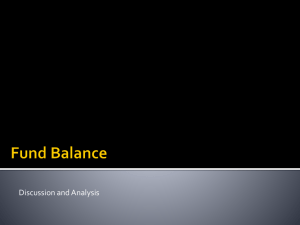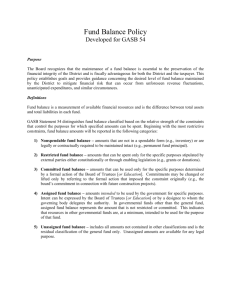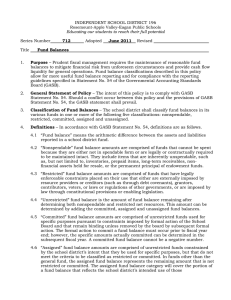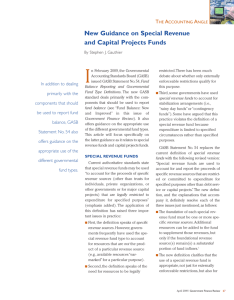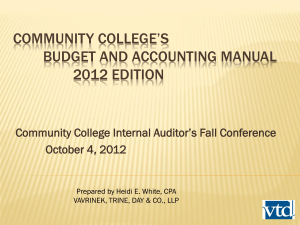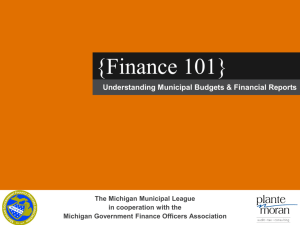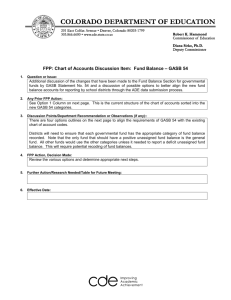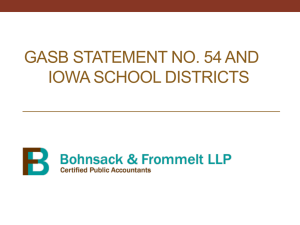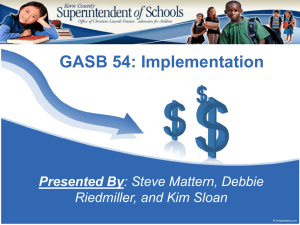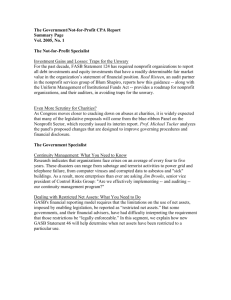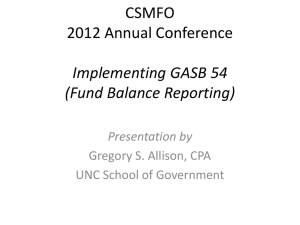Governmental Fund Balance Policy
advertisement
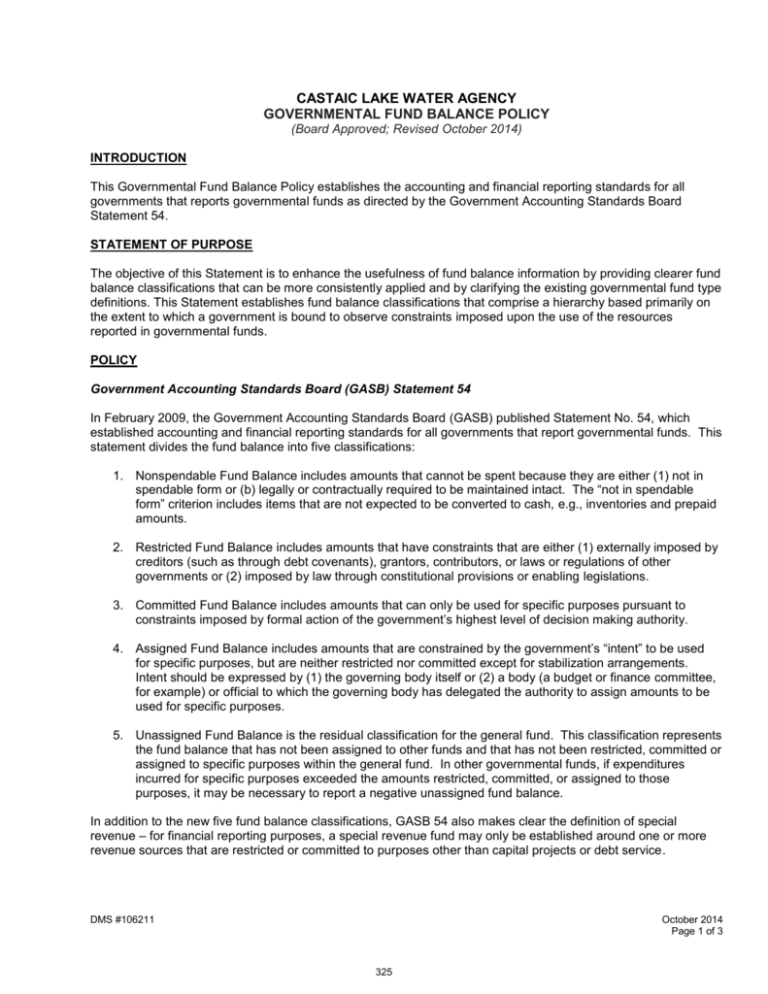
CASTAIC LAKE WATER AGENCY GOVERNMENTAL FUND BALANCE POLICY (Board Approved; Revised October 2014) INTRODUCTION This Governmental Fund Balance Policy establishes the accounting and financial reporting standards for all governments that reports governmental funds as directed by the Government Accounting Standards Board Statement 54. STATEMENT OF PURPOSE The objective of this Statement is to enhance the usefulness of fund balance information by providing clearer fund balance classifications that can be more consistently applied and by clarifying the existing governmental fund type definitions. This Statement establishes fund balance classifications that comprise a hierarchy based primarily on the extent to which a government is bound to observe constraints imposed upon the use of the resources reported in governmental funds. POLICY Government Accounting Standards Board (GASB) Statement 54 In February 2009, the Government Accounting Standards Board (GASB) published Statement No. 54, which established accounting and financial reporting standards for all governments that report governmental funds. This statement divides the fund balance into five classifications: 1. Nonspendable Fund Balance includes amounts that cannot be spent because they are either (1) not in spendable form or (b) legally or contractually required to be maintained intact. The “not in spendable form” criterion includes items that are not expected to be converted to cash, e.g., inventories and prepaid amounts. 2. Restricted Fund Balance includes amounts that have constraints that are either (1) externally imposed by creditors (such as through debt covenants), grantors, contributors, or laws or regulations of other governments or (2) imposed by law through constitutional provisions or enabling legislations. 3. Committed Fund Balance includes amounts that can only be used for specific purposes pursuant to constraints imposed by formal action of the government’s highest level of decision making authority. 4. Assigned Fund Balance includes amounts that are constrained by the government’s “intent” to be used for specific purposes, but are neither restricted nor committed except for stabilization arrangements. Intent should be expressed by (1) the governing body itself or (2) a body (a budget or finance committee, for example) or official to which the governing body has delegated the authority to assign amounts to be used for specific purposes. 5. Unassigned Fund Balance is the residual classification for the general fund. This classification represents the fund balance that has not been assigned to other funds and that has not been restricted, committed or assigned to specific purposes within the general fund. In other governmental funds, if expenditures incurred for specific purposes exceeded the amounts restricted, committed, or assigned to those purposes, it may be necessary to report a negative unassigned fund balance. In addition to the new five fund balance classifications, GASB 54 also makes clear the definition of special revenue – for financial reporting purposes, a special revenue fund may only be established around one or more revenue sources that are restricted or committed to purposes other than capital projects or debt service. DMS #106211 October 2014 Page 1 of 3 325 Compliance with GASB 54 Based on the GASB 54 statement discussion above, staff proposes the following changes: Governmental Funds The Agency will have five (instead of four) major governmental funds grouped into four (instead of three) governmental fund types. The four governmental fund types are: (1) a general fund to account for and report all financial resources not accounted for and reported in another fund, (2) special revenue fund to account for and report the proceeds of specific revenue sources that are restricted or committed to expenditure for specified purposes other than debt service or capital projects, (3) a capital projects fund to account for and report financial resources that are restricted, committed or assigned to expenditure for capital outlays including the acquisition or construction of capital facilities and other capital assets and (4) a debt service fund to account for and report financial resources that are restricted, committed, or assigned to expenditure for principal and interest. The Agency will have the following major governmental funds starting with Fiscal Year 2010/11 reporting: 1. General Fund – no change 2. Pledged Revenue Fund (special revenue fund) – debt proceeds from this fund will be move to new Capital Project Fund 3. Capital Projects Fund – to account for and report financial resources that are restricted, committed or assigned to expenditure for capital outlays, including the acquisition or construction of capital facilities and other capital assets 4. State Water Contract Fund (special revenue fund) – no change 5. Debt Service Fund – no change Fund Balance Classifications 1. The Nonspendable Fund Balance accounts for fund balances that are not in “spendable” form, such as inventories and prepaid amounts. 2. The Restricted Fund Balance accounts for fund balances that are restricted by debt covenants and laws. 3. The Committed Fund Balance accounts for fund balances that are committed for specific purposes by formal action of the Board of Directors of the Agency. 4. The Assigned Fund Balance accounts for fund balances that are constrained by the Agency’s “intent” to be used for specific purposes, but are neither restricted nor committed except for stabilization arrangements. Intent should be expressed by the Board of Directors of the Agency itself or a subordinate high-level body (a finance and administration committee, for example) or official to which the board has delegated the authority to assign amounts to be used for specific purposes. 5. The Unassigned Fund Balance accounts for fund balances that have not been assigned to other funds and that has not been restricted, committed or assigned to specific purposes. Summary The two tables below summarize the fund balance categories and classifications currently (before GASB 54) and proposed (after GASB 54). DMS #106211 October 2014 Page 2 of 3 326 Before GASB 54 Fund Balance: Reserved Unreserved General Fund X X Special Revenue Fund State Pledged Water Revenue Contract X N/A X N/A Debt Service Fund Debt Service Fund X N/A After GASB 54 Fund Balance: Nonspendable Restricted Committed Assigned Unassigned General Fund X X X X X Special Revenue Fund State Pledged Water Revenue Contract X X X X X X X N/A N/A N/A Debt Service Fund Debt Service Fund Capital Projects Fund N/A X N/A X N/A X X N/A X N/A (Originally Adopted June 2011) DMS #106211 October 2014 Page 3 of 3 327 Drought-Tolerant Tree Landscaping Ideas Pictured: Drought-tolerant trees to be considered as main features in your water-saving landscape design: (top) the African Sumac tree offers graceful, arching branches, weeping foliage with fragrant flowers and a picturesque trunk structure; (bottom left) the Bottlebrush tree with bright red blooms adds color and ensures regular visits from beneficial honey bees; (bottom right) the fast-growing Sunburst Honeylocust offers excellent shade while growing in adverse conditions. 328
